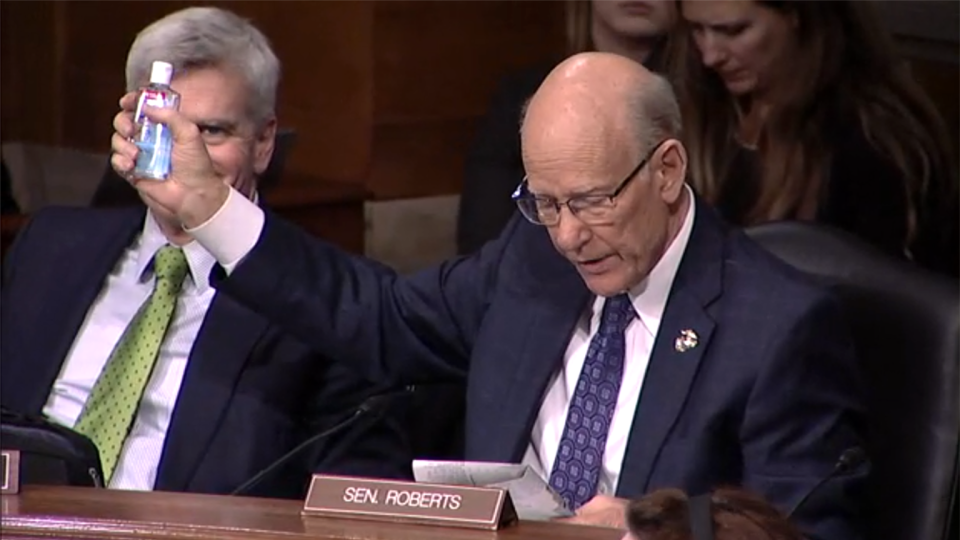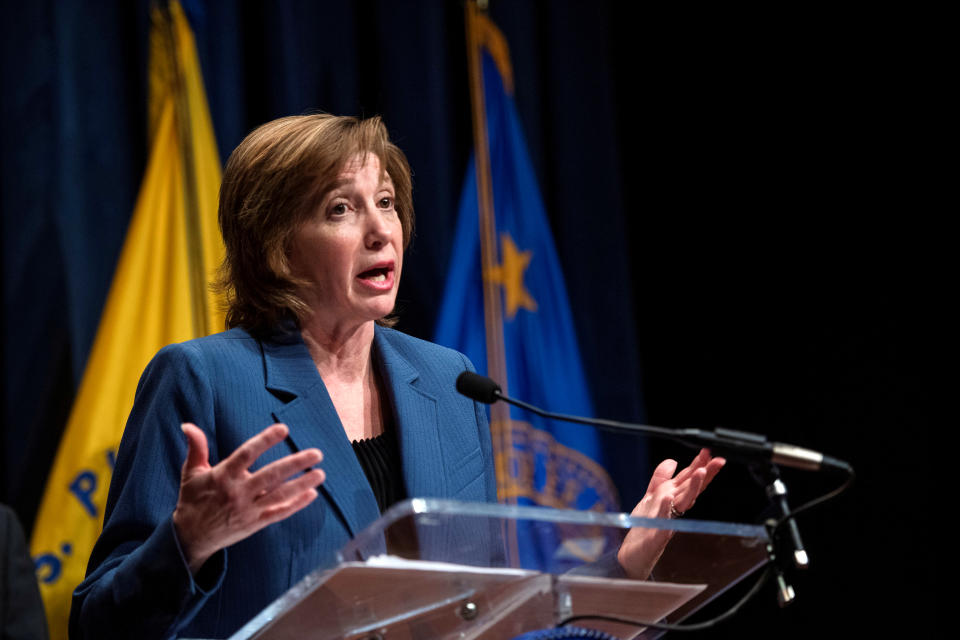Coronavirus threat reawakens bipartisan spirit in Congress, for now
WASHINGTON — At a Senate hearing on Tuesday morning, Sen. Pat Roberts, R-Kan., held up a small bottle of Purell hand sanitizer, which he said used to retail for $7. Now, he said, it was selling for $114.87 on Amazon, as Americans rush to buy products that might help fend off the coronavirus, which has resulted in nine deaths in the U.S. and more than 3,000 around the world.
Sitting next to him, Sen. Bill Cassidy, R-La., spied an opportunity.
“I’ll get it to you for $50," Cassidy joked.
The two men laughed, providing a rare moment of levity on a day when the nation seemed to be accustoming itself to a new normal: an incipient epidemic that has laid siege to an increasing number of states, including most recently to New Hampshire and North Carolina.
The recently concluded impeachment inquiry into President Trump left many legislators in Washington embittered and angry at the other party. But the coronavirus has driven the two parties back together again, requiring them to work together for the sake of public health. That made the capital’s routine calls for bipartisanship more than the usual mix of lip service and nostalgia.
“We don’t need to politicize a pandemic,” Roberts said during the morning hearing, musing that “maybe we ought to quarantine people for 14 days” if they can’t “shut up.”

Both lawmakers on Capitol Hill and officials in the White House have tried to maintain a balance between touting the public health system in the United States as unrivaled and warning that the outbreak is bound to get worse, with more cases, more deaths and more disruptions to Americans’ lives.
Speaking on a teleconference call with reporters, Dr. Nancy Messonnier, who leads the National Center for Immunization and Respiratory Disease at the Centers for Disease Control and Prevention, said the United States may be experiencing “the beginning of what is happening abroad.” She seemed to be referencing outbreaks in countries like South Korea, which has recorded 28 fatalities, and Italy, where 79 people have died from the disease.
The nations are second and third in the world, respectively, in their share of sickened individuals. The leader by far is China, where more than 80,000 people have contracted the coronavirus and nearly 3,000 have died. But in an auspicious development, Beijing’s strict containment measures appear to have succeeded in slowing the spread of the coronavirus across the nation that contains 20 percent of the world’s population.

Trump visited the National Institutes of Health on Tuesday, where he urged some of the nation’s top scientists to speed up work on test kits, treatments and vaccinations for the coronavirus.
“I guess therapeutics can happen faster than the actual vaccine,” the president said. “And certainly the result can happen a lot faster. So we’re looking for some good answers.”
But earlier that day, top NIH immunologist Anthony Fauci — who was also present for Trump’s visit later in the day — cautioned in remarks on Capitol Hill that both vaccines and therapeutics are many months away. CDC tests kits were found to be flawed, slowing their distribution. Public health officials have rushed to expand the testing regime and make it responsive to local needs.
In seeming recognition that the coronavirus situation could quickly — and disastrously — unravel, the administration has tried to provide legislators on Capitol Hill with frequent updates, something it has been reluctant to do at other times (most notably, in recent months, when it made a unilateral decision to assassinate top Iranian General Qassem Soleimani).
Leaving a briefing with Vice President Mike Pence on Tuesday, Sen. Ben Cardin, D-Md., said he believed that “Vice President Pence is surrounding himself with the experts he needs.” This praise seemed to address the criticism that the Trump administration shuns expertise that doesn’t comport with its political preconceptions. A deadly epidemic is unlikely to allow for much leeway of this kind.

As he had previously, Food and Drug Administration commissioner Stephen Hahn told lawmakers on Tuesday that 1 million coronavirus test kits would be available by the end of the week, an estimate many believe is unrealistic.
Indeed, as The Hill reported, test kits are emerging as both a public health and political problem for the administration, with some Republicans sharing in “growing concerns among Democrats and experts that there are not enough tests being made available, hindering the ability of officials to know how widespread the virus is within the United States.”
Joining the Democratic criticism of the testing regime, Sen. Marco Rubio, R-Fla., said after the vice president’s briefing that “our capacity is not where it needs to be right now” in regard to testing.
The efforts of Republicans and Democrats alike did not exactly amount to the return of political comity in the nation’s capital. But in the face of a possible public health crisis, both parties seem willing to emerge from their trenches for the common good.
_____
Read more from Yahoo News:



